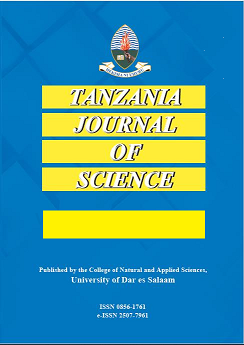EXPLORING DIFFERENCES AMONG ILLEGAL ACTIVITIES IN THE UGALLA GAME RESERVE OF WESTERN TANZANIA
Keywords:
western Tanzania, illegal activities, illegal resource user belongings, illegal activity signsAbstract
Conservation efforts in Tanzania rarely assess the extent to which different resource user activities are related. This study aimed to explore the differences among various illegal activities occurring in Ugalla Game Reserve, western Tanzania. The study used a combination of ranger–collected data, from 2003 to 2010, and foot surveys of illegal activity signs in the reserve. Illegal activity signs were recorded for five different types of offence: illegal fishing, bushmeat hunting, illegal logging, other activity (any sign that indicated any other type of unauthorised user presence) and honey gathering. The most frequent activity was logging (602 signs; 58% of offenders arrested), followed by bushmeat hunting (106; 25%). Illegal activity signs varied spatially across the reserve (F4, 563.9 = 11.50, p < 0.001; GLMM). For example, loggers seemed to concentrate their activities at East Ugalla more than West Ugalla, whereas hunters mostly performed their behaviour in the southern Ugalla. Saws, guns, fishing nets and other personal belongings were used for resource extraction. The analysis of confiscated illegal resource user belongings suggested little overlap between illegal activities. The first three axes of a canonical variate analysis clearly separated each of the types of illegal resource user belongings from every other type. On balance, different types of illegal activity are concentrated in specific areas within the reserve; and offenders used different methods to conduct these activities, which present a different level of threat to conservation efforts. Thus, anti–poaching patrols should consider the nature and distribution pattern of each illegal activity separately to devise more effective ways of controlling them. Indeed, more work is still needed to well understand key drivers of resources exploitation and the governance context framing the management of Ugalla


